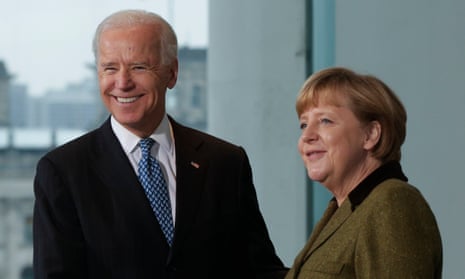Most world leaders rushed to congratulate Joe Biden on his election, but Russia and China, two likely losers from the defeat of Donald Trump, remained silent, perhaps waiting for the outgoing president to concede defeat.
The president of the Maldives, Ibrahim Mohamed Solih, is thought to be the first to have congratulated Biden, tweeting his welcome within 24 minutes of the US networks declaring Biden victorious. By contrast, Vladimir Putin, accused of collusion in Trump’s 2016 victory, and Xi Jinping kept their counsel.
Iran, suffering from Trump-inspired sanctions and now recording nearly 500 Covid-related deaths daily, celebrated Trump’s demise and said the US should now compensate Iran for its mistakes.
Iran’s president, Hassan Rouhani, due to leave office next summer, said he will wait to see what Biden does before deciding if there is any difference between Trump and his successor.
Rouhani said: “Trump’s damaging policy has been opposed by the American people. The next US administration should use the opportunity to make up for past mistakes.”
Iran’s foreign minister, Javad Zarif, said Washington’s deeds not words will matter most. On Saturday the supreme leader, Ayatollah Ali Khamenei, mocked the US elections, saying it was “an example of the ugly face of liberal democracy”, which has shown the “definite political, civil, and moral decline of the US regime”.
Tensions also spilled out from Turkey, with figures close to Recep Tayyip Erdoğan warning Biden not to support Syrian Kurds or challenge Turkey’s wider ambitions in the Middle East.
The Turkish vice-president, Fuat Oktay, said Trump’s defeat would not change relations between the old allies. “The channels of communication will work as before, but of course there will be a transition period,” he said, adding Ankara would closely monitor Biden’s foreign policy approach.
Biden and Turkey are likely to clash over US support for the Syrian Kurdish YPG – seen as a cornerstone in the fight against Islamic State by the Democrats, but by the Turks as a branch of the PKK Turkish Kurd terrorist group. Trump’s haphazard diplomacy has seen US influence across the Middle East decline with Russia and Turkey ever more willing to fill the vacuum.
No immediate statement came from the Saudi royal court, which is heavily dependent on US defence hardware to protect itself. The left in the Democratic party wants “an end to forever wars”, especially a withdrawal of US support for the Saudi war in Yemen. The Saudis also want to end the disastrous intervention so long as it does not leave Yemen under complete control of Houthi rebels.
Israel’s leader, Benjamin Netanyahu, a close ally of Trump, sent Biden formal congratulations without naming him president-elect, but Israel will want reassurances about the US maintaining pressure on Iran and its continued support for the normalisation of relations between Israel and Arab states.
In Asia, most countries are looking for a continued tough line on China and also more detail on the balance between cooperation and confrontation with the world’s rising super power.
Angela Merkel said the “transatlantic friendship is irreplaceable if we are to meet the great challenges of this time”, while Macron said Europe and the US “have a lot to do to overcome today’s challenges. Let’s work together!”
The European council president, Charles Michel, listed “Covid-19, multilateralism, climate change and international trade” as areas of future cooperation, while the EU’s foreign policy chief, Josep Borrell, spoke of a “great day for US and Europe”, and of the need to “rebuild our partnership”.
Biden’s key foreign policy priorities, apart from making appointments to the state department subject to congressional approval, are likely to be an offer to cooperate in the fight against coronavirus, an immediate commitment to rejoin the UN Paris climate agreement and, more broadly, to promise a change in tone toward traditional US allies. An early visit to Brussels either to meet EU or Nato leaders would symbolise this approach.
Despite Biden’s adviser Tony Blinken talking last month of ending the “artificial trade war” with the EU, the EU’s special foreign policy adviser, Nathalie Tocci, said she anticipated that protectionism is here to stay. “Election results show that Trumpism is alive and kicking and it is something that he [Biden] cannot ignore,” she said.
The Biden team will also have to decide whether it is worth promising to rejoin the Iran nuclear deal that Trump deserted in 2016. Many Iran specialists are urging Biden to go for a quick win and lift sanctions in return for an Iranian commitment to abide by its commitments in the accord. Debate within Iran is shaped by presidential elections in June, with some saying an olive branch from Biden will help the cause of reformists in its elections.
Iran’s leaders have so far ruled out any wider talks aimed at curbing Tehran’s nuclear activity, halting its ballistic missile programme, and limiting the Islamic Republic’s regional influence.
Biden will also need to balance the time he devotes to foreign policy with the domestic demand to lower the Covid-19 infection rate, and keep the economy afloat. His degree of foreign policy manoeuvre will depend on whether in January the Democrats can wrest control of the Senate in two runoffs in Georgia.
